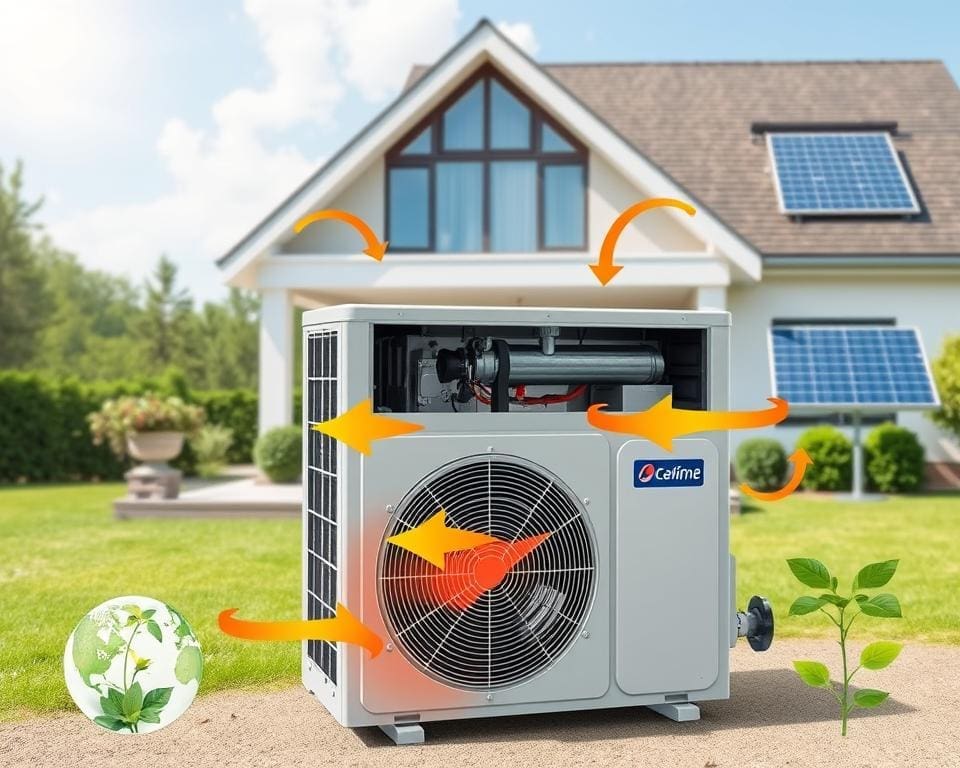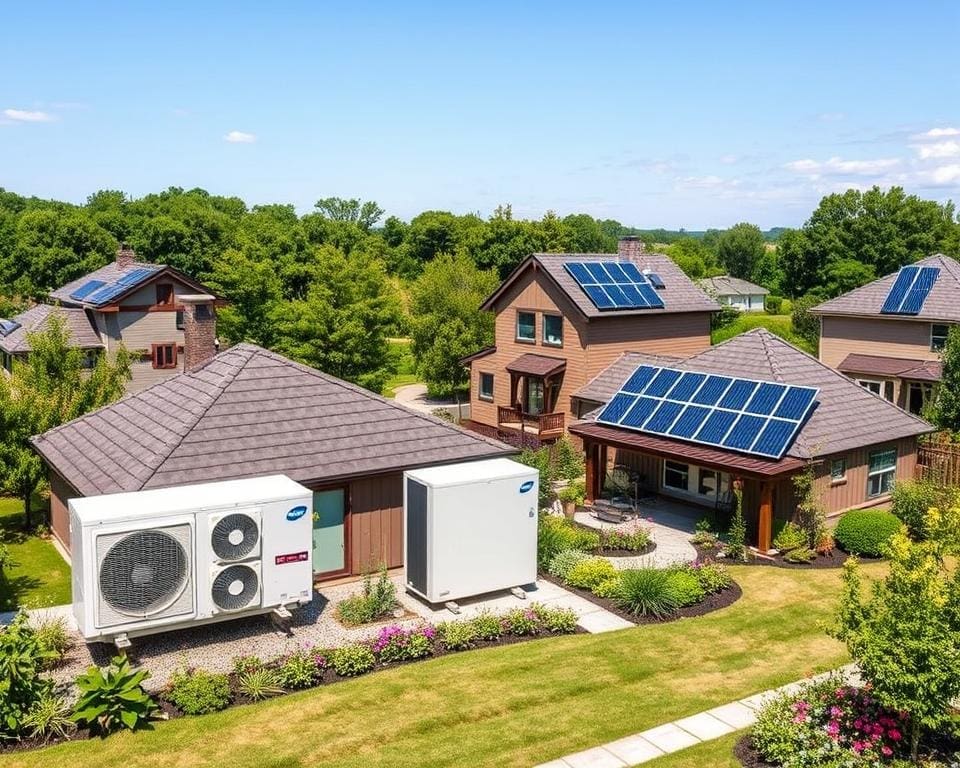In an era where climate change poses a pressing challenge, heat pumps emerge as a pivotal innovation in eco-friendly heating. These remarkable systems offer a sustainable heating solution that significantly reduces our carbon footprints when compared to traditional fossil fuel heating systems. As the demand for renewable energy intensifies in the United Kingdom, homeowners are increasingly seeking energy-efficient solutions that align with governmental and environmental standards.
Understanding the function and benefits of heat pumps is essential for anyone looking to transition towards more sustainable heating solutions. By integrating heat pumps into our homes, we not only enhance our living environments but also contribute to a larger movement towards renewable energy, making a meaningful impact in the fight against climate change.
Understanding Heat Pumps and Their Functionality
Heat pumps offer an innovative solution for homeowners seeking effective heating options. These devices are designed to transfer heat from one location to another, utilising various sources such as air, ground, or water. Their versatile nature makes them particularly appealing in the realm of energy-efficient heating systems.
What are Heat Pumps?
Heat pumps serve as critical components in modern heating strategies. They are defined as devices that capture thermal energy from the environment and transport it to desired spaces, whether residential or commercial. These systems can significantly reduce reliance on fossil fuels while providing reliable warmth during colder months.
How Do Heat Pumps Work?
The functionality of heat pumps centres around the principle of heat exchange. At the core of their operations lies a compressor, which plays a vital role in moving heat efficiently. During the process, refrigerants circulate within the system, absorbing heat from the atmosphere or ground and releasing it indoors. Even in cooler temperatures, heat pumps can extract warmth, making them suitable for various climate conditions.

Benefits of Heat Pumps for Sustainable Heating Solutions
As society becomes increasingly aware of the impact of traditional heating methods on the environment, the search for more sustainable solutions intensifies. Heat pumps emerge as a prime candidate due to their remarkable advantages. Focusing on their cost-effectiveness and energy savings provides a clearer picture of why homeowners consider adopting these systems. The environmental impact of heat pumps also plays a crucial role in shaping a greener future.
Cost-Effectiveness and Energy Savings
One of the standout benefits of heat pumps lies in their impressive cost-effectiveness. Homeowners can significantly reduce their energy bills when compared to more conventional heating systems. The operational costs associated with heat pumps are often lower due to their efficient energy utilisation. Research indicates that heat pumps can offer energy savings of up to 50% when replacing outdated heating methods. This efficiency translates to both financial savings and a reduction in dependence on fossil fuels.
Environmental Impact of Heat Pumps
Heat pumps represent a truly environmentally friendly heating option. By using renewable energy sources, they help lower carbon emissions associated with traditional heating. A substantial number of homes are transitioning to heat pumps, contributing positively to climate change mitigation efforts. As countries strive to meet their carbon reduction targets, the adoption of heat pumps aligns perfectly with these initiatives, reinforcing their role as crucial allies in sustainable living practices.
Heat Pumps: The Future of Eco-Friendly Heating
Heat pumps represent a revolutionary step toward the future of eco-friendly heating. As society increasingly prioritises sustainability, the demand for renewable energy solutions continues to grow. Heat pumps not only utilise natural elements but also improve energy efficiency, making them vital in this transformation.
Various government initiatives and grants are facilitating this change. Homeowners are encouraged to embrace these innovative systems, promoting households that align with eco-friendly principles. As this trend gains momentum, it positions heat pumps as a cornerstone of a self-sustainable future.
Market trends indicate the heat pump industry is on the rise. Technological advances, such as sophisticated heat pump controllers and the integration of home automation systems, offer enhanced user experiences. These developments assure consumers that adopting heat pumps contributes significantly to their energy needs while reducing their carbon footprint.
The embrace of heat pumps reflects a broader commitment to renewable energy. Homeowners are no longer just consumers of energy but proactive participants in fostering a sustainable ecosystem. By adopting these systems, individuals can look forward to creating energy-efficient homes that contribute meaningfully to protecting the environment.
Types of Heat Pumps and Their Applications
In the world of heating solutions, understanding the various types of heat pumps available can significantly enhance energy efficiency and sustainability. Each type serves unique applications, catering to different environmental conditions and user needs.
Air Source Heat Pumps
Air source heat pumps represent one of the most popular types of heat pumps, primarily due to their straightforward installation process. These systems extract heat from the outdoor air, making them effective for mild climates. Their compact design allows for integration into both new builds and retrofitted properties, providing flexibility and efficiency in heating and cooling.
Ground Source Heat Pumps
Ground source heat pumps, often referred to as geothermal heat pumps, harness the stable temperature of the ground to provide heating and cooling. They are particularly suited for colder regions, where they demonstrate remarkable efficiency. These systems involve burying loops of pipe underground, which circulate a fluid to extract heat or coolness from the earth, ensuring a constant and reliable energy source.
Water Source Heat Pumps
Water source heat pumps depend on nearby bodies of water for temperature regulation. These systems excel in industrial applications, where they can effectively extract heat from lakes, rivers, or aquifers. By utilising the consistent temperature of these water sources, water source heat pumps deliver effective heating solutions while promoting energy efficiency.
Heat Pump Installation: What You Need to Know
For homeowners exploring the benefits of heat pumps, understanding the intricacies of heat pump installation is essential. A successful installation hinges upon choosing a qualified installer who can guarantee both efficiency and safety. The installation process involves several critical steps, ensuring that the system operates optimally. Awareness of installation costs plays a significant role in decision-making, helping homeowners to balance initial investments against potential savings.
Choosing a Qualified Installer
Selecting a qualified installer is pivotal for a successful heat pump installation. Look for installers with certifications from recognised organisations, such as the Microgeneration Certification Scheme (MCS). Seek recommendations and examine customer reviews to ensure reliability. A well-trained installer possesses the necessary expertise to handle the particulars of various heat pump systems, leading to reduced risks of future complications.
Installation Process Overview
The installation process typically includes several stages:
- Site Assessment: A qualified installer evaluates your property to determine the suitable heat pump type and size.
- Preparation: Necessary preparations are made, including securing permits and ensuring the installation area is accessible.
- System Installation: The installer fits the heat pump, connecting it to the electrical and plumbing systems as required.
- Testing: After installation, rigorous testing ensures the system operates correctly before handover.
- Service Orientation: The installer provides essential guidance on operating the new heat pump effectively.
Understanding Installation Costs
Installation costs can vary widely based on several factors. Expect to consider the size and type of the heat pump, as larger units or more advanced models often require greater investment. Labour costs associated with hiring a qualified installer will also play a role. Evaluating your long-term savings against these initial installation costs can demonstrate the true value of investing in a heat pump system.
Exploring Renewable Energy Alternatives
As the world increasingly turns towards renewable energy for its eco-friendly heating solutions, exploring sustainable solutions goes beyond relying solely on heat pumps. Homeowners should consider the potential of integrating complementary systems, such as solar photovoltaic panels and biomass heating, into their energy strategies. By doing so, individuals can enhance their households’ energy efficiency and reduce reliance on fossil fuels.
The combination of heat pumps with these energy-efficient options not only amplifies the benefits but also creates a synergistic effect that optimises energy use throughout the year. For example, during sunny months, solar panels can generate electricity, contributing to the power needed to operate heat pumps efficiently. This collaborative approach ensures that homes are not only warm but also part of a larger movement towards sustainable living.
Moreover, with advancements in technology and policy shifts favouring renewable energy, now is the time for individuals to act. Embracing these innovative solutions positions households as active participants in a greener future, ultimately making informed choices about their heating needs. The journey towards eco-friendly heating is more accessible than ever and holds the promise of a sustainable world for generations to come.









